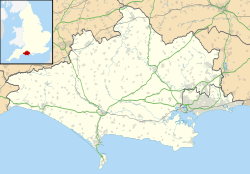Tarrant Abbey
 St Mary's Church | |
| Monastery information | |
|---|---|
| Full name | The abbey of St Mary and All Saints |
| Order | Cistercian |
| Established | 1186 |
| Disestablished | 1539 |
| People | |
| Founder(s) | Ralph de Kahaines |
| Important associated figures | Queen Joan, Bishop Richard Poore |
| Architecture | |
| Heritage designation | Scheduled Monument 1002715 - ruins Grade I listed building 1110840 - church |
| Designated date | 26 June 1963 |
| Site | |
| Location | Tarrant Crawford, Dorset |
| Coordinates | 50°49′53″N 2°07′20″W / 50.831431°N 2.122276°W |
Tarrant Abbey was a Cistercian nunnery in Tarrant Crawford, Dorset, England.[1]
History
[edit]The abbey was founded as an independent monastery in 1186 by Ralph de Kahaines (of nearby Tarrant Keyneston) and has been identified as a possible site of "Camestrum", referred to by Gervase of Canterbury.[2] The abbey was then re-founded in either 1228 or 1233 as a Cistercian nunnery, later supposedly the richest in England.[citation needed]
Two famous people are associated with the abbey. The first is Queen Joan, the wife of Alexander II of Scotland and daughter of King John of England, who is buried in the graveyard (supposedly in a golden coffin).[3] The second is Bishop Richard Poore, builder of Salisbury Cathedral, who was baptised in the abbey church and later (in 1237) buried in it, as its second founder.[4]
The church of St Mary the Virgin, the parish church of Tarrant Crawford, is all that remains of Tarrant Abbey.[5][6] It was the lay church of the abbey and was built in the 12th century. It has now been designated as a Grade I listed building[7] and is now in the care of the Churches Conservation Trust.[8] The site of the abbey is a Scheduled monument containing mostly buried remains.[2]
Known Abbesses of Tarrant Abbey
[edit]- Claricia, elected about 1228
- Emelina
- Maud, occurs 1240[9]
- Isolda, occurs 1280
- Elena, elected 1298[10]
- Anne, occurs 1351[11]
- Clemence de Cernyngton, occurs 1377[12]
- Joan, occurs 1402[13]
- Avice, occurs 1404[14]
- Edith Coker, died in 1535[15]
- Margaret Lynde (uncertain)
- Margaret Russell, elected 1535, surrendered to Henry VIII in March 1539.[16][17]
References
[edit]- ^ Anthony Emery, Greater Medieval Houses of England and Wales, 1300–1500: Volume 3, Southern England (Cambridge University Press, 2006) page 596
- ^ a b Historic England. "Site of Tarrant Abbey (1002715)". National Heritage List for England. Retrieved 29 June 2016.
- ^ "Tarrant Crawford, St Mary's Church". Britain Express. Retrieved 18 October 2010.
- ^ "A Visit to Tarrant Crawford Church". Britain Express. Retrieved 18 October 2010.
- ^ Saint Marys Church, Tarrant Crawford, Dorset.
- ^ Diocese of Salisbury: All Schemes, Church Commissioners/Statistics, Church of England, 2011, p. 10, retrieved 31 March 2011.
- ^ "Church of St Mary". historicengland.org.uk. English Heritage. Retrieved 18 October 2010.
- ^ "St Mary the Virgin, Tarrant Crawford". Churches Conservation Trust. Retrieved 18 October 2010.[permanent dead link]
- ^ Chart. R. 24 Hen. III, m. 3.
- ^ Sarum Epis. Reg. Simon of Ghent, i, fol. 33.
- ^ Cal. of Pap. Letters, iii, 407.
- ^ Pat. 5 Ric. II, pt. 1, m. 31.
- ^ 3 Hen. IV, pt. 2, m. 17 d.
- ^ 5 Hen. IV, pt. 2, m. 29d.
- ^ en. VIII, ix, 236.
- ^ 'House of Cistercian nuns: The abbey of Tarrant Kaines', A History of the County of Dorset: Volume 2 (1908), .ac.uk/report.aspx?compid=40146 page 87.
- ^ Deeds of Surrender, No. 233
- Monasteries in Dorset
- Cistercian nunneries in England
- Christian monasteries established in the 1180s
- 12th-century establishments in England
- 12th-century church buildings in England
- Grade I listed churches in Dorset
- Grade I listed monasteries
- 1186 establishments in England
- Dorset building and structure stubs
- United Kingdom Christian monastery stubs

